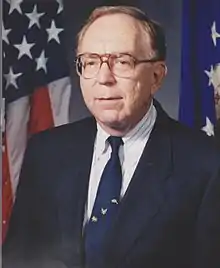Edward Feigenbaum
Edward Albert "Ed" Feigenbaum (born January 20, 1936) is a computer scientist working in the field of artificial intelligence, and joint winner of the 1994 ACM Turing Award.[4] He is often called the "father of expert systems."[5][6][7][8]
Ed Feigenbaum | |
|---|---|
 | |
| Born | Edward Albert Feigenbaum January 20, 1936 |
| Nationality | American |
| Alma mater | Carnegie Mellon University (BS, PhD) |
| Known for | Expert systems EPAM DENDRAL project Feigenbaum test |
| Awards | Turing Award (1994) Computer Pioneer Award AAAI Fellow (1990)[1] ACM Fellow (2007) |
| Scientific career | |
| Fields | Computer science Artificial intelligence |
| Institutions | Stanford University United States Air Force |
| Doctoral advisor | Herbert A. Simon |
| Doctoral students | |
| Website | ksl-web |
Education and early life
Feigenbaum was born in Weehawken, New Jersey in 1936 to a culturally Jewish family, and moved to nearby North Bergen, where he lived until the age of 16, when he left to start college.[9][10] His hometown didn't have a secondary school of its own and he chose Weehawken High School for its college preparatory program.[10][11] He was inducted into his high school's hall of fame in 1996.[12]
Feigenbaum completed his undergraduate degree (1956), and a Ph.D. (1960),[2][13][14] at Carnegie Institute of Technology (now Carnegie Mellon University). In his PhD thesis, carried out under the supervision of Herbert A. Simon, he developed EPAM, one of the first computer models of how people learn.[15]
Career and research
Feigenbaum completed a Fulbright Fellowship at the National Physics Laboratory and in 1960 went to the University of California, Berkeley, to teach in the School of Business Administration. He joined the Stanford faculty in 1965 as one of the founders of its computer science department.[16] He was the director of the Stanford Computation Center from 1965 to 1968. He established the Knowledge Systems Laboratory at Stanford University. Important projects that Ed was involved in include systems in medicine, as ACME, Mycin, SUMEX, and Dendral. He also co-founded companies IntelliCorp and Teknowledge.
Since 2000 Ed Feigenbaum is a Professor Emeritus of Computer Science at Stanford University. His former doctoral students include Peter Karp,[3] Niklaus Wirth,[2] and Alon Halevy.[2]
Honors and awards
- 1984: Selected as one the initial fellows of the American College of Medical Informatics (ACMI)
- 1994: Turing Award jointly with Raj Reddy for "pioneering the design and construction of large scale artificial intelligence systems, demonstrating the practical importance and potential commercial impact of artificial intelligence technology".
- 1997: U.S. Air Force Exceptional Civilian Service Award
- 2007: Inducted as fellow of the Association for Computing Machinery (ACM)[17][18]
- 2011: IEEE Intelligent Systems AI's Hall of Fame for "significant contributions to the field of AI and intelligent systems".[19][20]
- 2012. Made fellow of the Computer History Museum "for his pioneering work in artificial intelligence and expert systems."[21]
- 2013. IEEE Computer Society Computer Pioneer Award for "pioneering work in Artificial Intelligence, including development of the basic principles and methods of knowledge-based systems and their practical applications".
References
- Elected AAAI Fellows
- Edward Albert Feigenbaum at the Mathematics Genealogy Project
- Karp, Peter Dornin (1988). Hypothesis Formation and Qualitative Reasoning in Molecular Biology. dtic.mil (PhD thesis). Stanford University. doi:10.1609/aimag.v11i4.859. OCLC 20463112.
- David Alan Grier. (Oct.-Dec. 2013). "Edward Feigenbaum [interview]." Annals of the History of Computing. p. 74-81.
- "Edward Feigenbaum 2012 Fellow". Archived from the original on 2013-05-09. Retrieved 2012-01-30.
- Feigenbaum, Edward A.; McCorduck, Pamela (1983). The Fifth Generation: Artificial Intelligence and Japan's Computer Challenge to the World. Addison Wesley Publishing Company.
- "The Age of Intelligent Machines: Knowledge Processing--From File Servers to Knowledge Servers by Edward Feigenbaum". Archived from the original on 2016-06-10. Retrieved 2013-05-29.
- Feigenbaum, Edward A. (2003). "Some challenges and grand challenges for computational intelligence". Journal of the ACM. 50 (1): 32–40. doi:10.1145/602382.602400. S2CID 15379263.
- Len Shustek. "An Interview with Ed Feigenbaum". Communications of the ACM. Retrieved 14 October 2013.
- Knuth, Don. "Oral History of Edward Feigenbaum, Computer History Museum, 2007. Accessed October 23, 2015. "I was born in Weehawken, New Jersey, which is a town on the Palisades opposite New York. In fact, it’s the place where the Lincoln Tunnel dives under the water and comes up in New York. Then my parents moved up the Palisades four miles to a town called North Bergen, and there I lived until I was 16 and went off to Carnegie Tech."
- Lederberg, Joshua. "How DENDRAL was conceived and born", United States National Library of Medicine, November 5, 1987. Accessed October 23, 2015. "I became an expert on its use. I even remember dragging it with me miles on the bus to Weehawken High School, heavy as it was, just to show off my skill with this marvelous technology that no other kid in the high school knew anything about."
- Hague, Jim. "Academic awards aplenty; Weehawken honors top students, inducts Pasquale into Hall of Fame", Hudson Reporter, May 13, 2000. Accessed October 23, 2015. "Edward Feigenbaum (Class of '53) in 1996"
- Edward A. Feigenbaum at the AI Genealogy Project.
- "ProQuest Document ID 301899261". ProQuest Dissertations and Theses. ProQuest 301899261.
- "Guide to the Edward A. Feigenbaum Papers" (PDF). Stanford University. 2010. p. 2. Retrieved September 12, 2011.
- "Edward A. Feigenbaum Papers". Stanford University. 2012.
- "Edward A Feigenbaum". awards.acm.org. Retrieved 2019-08-24.
- "Edward Feigenbaum on Artificial Intelligence | Entitled Opinions". entitledopinions.stanford.edu. Retrieved 2019-08-24.
- "AI's Hall of Fame" (PDF). IEEE Intelligent Systems. IEEE Computer Society. 26 (4): 5–15. 2011. doi:10.1109/MIS.2011.64.
- "IEEE Computer Society Magazine Honors Artificial Intelligence Leaders". DigitalJournal.com. August 24, 2011. Retrieved September 18, 2011. Press release source: PRWeb (Vocus).
- "Edward Feigenbaum". Computer History Museum. Archived from the original on 2013-05-09. Retrieved 2013-05-23.